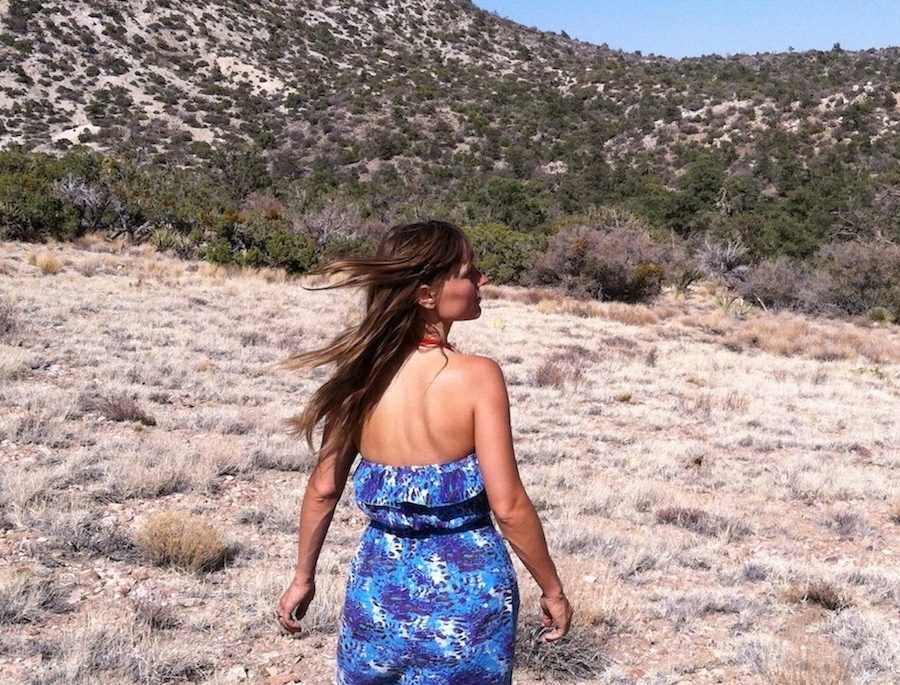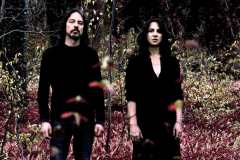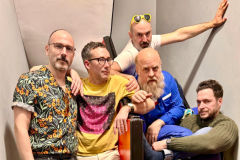It has been said that no person can step into the same river twice. This is because new water is always flowing and the person stepping in is always changed. It could be said that Rio en Medio’s Danielle Stech-Homsy delivers a similar experience with her new album of inspired folk music, some covers, some originals, titled Rio en Medio Radio. Rio en Medio Radio was released on Women’s Work Recordings November 20.
Shifting waters graze the shore, mesmerizing ripples evoke a myriad of images and sentiments, depending on what time of day it is or season of the year. Language itself turns fluid, as Danielle sings of things to be felt – and isn’t that enough? – in English, French, Welsh and so on. you’ve ever heard her music before, the approach will not surprise you – organic, spartan baritone ukulele, guitar, cosmic keyboards and harmonizing vocals form the backbone of the songs. Here and there a friend drops in to play along – in this case, Terry Cox, original member of the 1960’s folk-baroque band Pentangle (& contributing drummer for David Bowie, The Bee Gees) lends his nuanced approach on drums, while Dave Roe (Johnny Cash) chimes in merrily on bass to fill the speakers at just the right moments. Naybob Shineywater (Library of Sands, BrightBlack Morning Light) contributes lead guitar and percussion in highlighted places. Harmonica is played by George Flynn, a 90+ year-old war veteran & former chauffeur for Hank Williams.
Ghettoblaster recently caught up with Stech-Homsy to discuss the record. This is what she told us.
When did you begin writing the material for your most recent album?
This new album Rio en Medio Radio is pretty timeless. The songs I can take credit for span a period from 2004 to 2014. Some of the songs on the album were written by other people going back as far as the 11th Century or as recent as the 1800s or 1950s. Those songs come from all over the world and some of them are anonymous, so even the author’s identity is a mystery.
What was the most difficult song to take from the initial writing stage through recording and mixing? Why was it so troublesome?
“The Fox and the Little Prince” is a song I wrote back in 2004 based on the book The Little Prince. I had recorded a version back then, but I knew I could do better. Still, I wanted to preserve the freshness and innocence of the original recording, which proved to be more difficult than I anticipated. I wanted my mature self to lend earthiness while respecting the light, off-the-cuff style of the original. Oh, also the song’s in French, so I had to be respectful of that as well.
Which of the songs on the record is most different from your original concept for the song?
“Thread Song” was originally a completely different song but I ditched the old lyrics and wrote “Thread Song” to the same melody.
Did you have any guest musicians play or sing on the record?
I was lucky to have several really excellent musicians on board. Dave Roe is a Nashville bass player who worked with Johnny Cash for ten years in the Tennessee Three. The drums were played by Terry Cox who co-founded the 1960s British folk rock band Pentangle along with Bert Jansch, also played with Bowie and the Beegees. Brightblack Morning Light/ Library of Sands frontman Nathan Shineywater also helped co-produce the album and played some beautiful guitar leads and other instruments such as bass keys and Ashiko hand drum.
Who produced the record? What input did that person have that changed the face of the record?
I worked together with Nathan Shineywater (Brightblack Morning Light, Library of Sands) to produce the album. I had my own vision but Nathan helped me build up my studio and elevate my recordings with some key equipment and also directed me to Terry Cox of Pentangle. He also contributed some stunning guitar work as well as other instrumentation.
Is there an overarching concept behind your new album that ties the record together?
It usually takes me a couple of years to figure out what an album is doing and I consider that kind of meaning-making to be a collaboration with the listeners. But I think there is something in there about roots and whatever holds things together. “Terrapin Karma” is a song on the record that is named after a free-spirited homeless girl I met on my own travels. A terrapin is something like a turtle, so what does it mean to have turtle karma? You carry your home with you, I guess. The songs on the album are kind of like that. They are disconnected from their place of origin, from their time of origin and even from their original authors, but somehow maintain a rootedness. Maybe that root is pure melody. Or maybe it’s in how the songs have endured and crossed centuries and continents to be breathed by this 21st century woman out in the middle of the California desert.
Have you begun playing these songs live and which songs have elicited the strongest reaction from your fans?
Some of these songs have been mainstays of my live playlist for years. “Where the Love Lay” is one I always like to share and seems to reverberate with people. I enjoy performing some of the songs in other languages. They seem to take listeners on an imaginative journey. That’s always needed, I think:)
(Check it out here:
My Music Website:www.RioEnMedioRadio.com
WW Recordings Website:www.WWRecordings.com)
Establishing Roots; An interview with Danielle Stech-Homsy of Rio en Medio









Social Media